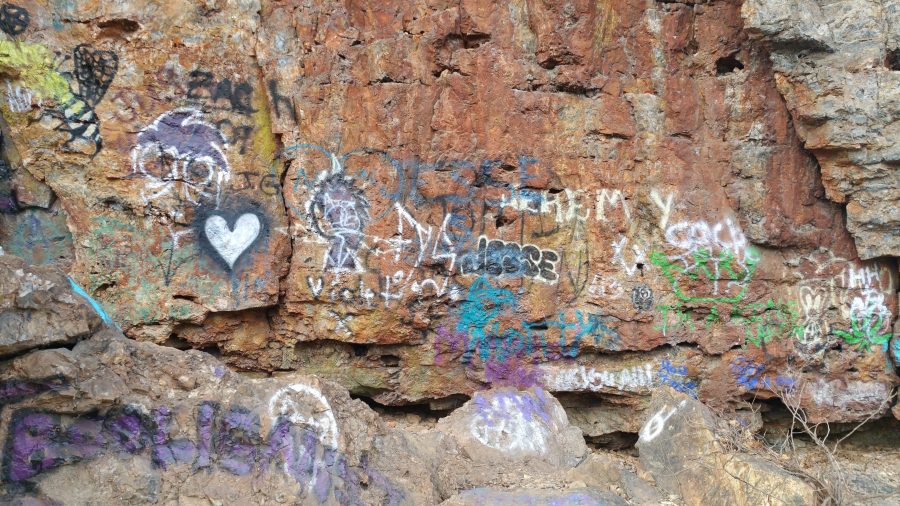One of the biggest things I hate is seeing trash and vandalism at my favorite outdoor spots. It seems to have become a bigger issue with the invention of social media. Hard work has been done by people before them in order to keep these locations clean. However, more people continue to find these cool locations, and refuse to give respect to the area. What we have to understand is not everything is done maliciously.
I’m constantly growing as a person. I’m in no way perfect and make my good share of mistakes. But, as I grow I try to learn from these mistakes. One example I will share is recently dealing with someone who vandalized a tree near the Buffalo National River. The person carved their name in a local tree and posted it on social media. I had a knee-jerk reaction that wasn’t helpful. I copied the post and shared it. Not really thinking about the situation, I shared the name of the person. Granted they posted this publicly and I felt the images were fair gain to use. However, the biggest mistake was sharing the name of the person. In doing so I wasn’t helping the situation and my post was perceived as public shaming.
When my good friends pointed this out I realized how unproductive my post really was. I took the post down and it got me thinking. My thoughts bounced back and forth on what would be the best way to educate people in keeping our natural places natural without pushing people away. Obviously, my reaction of “public shaming” this individual wasn’t the best way of doing this. Fortunately, this mistake caused me to think in depth of what to do.
I really don’t know if there is a 100% perfect answer to this problem. I know some people just don’t care. But like the person who shared their post of a carved tree, they just didn’t seem to understand what they did wrong. Otherwise, they wouldn’t have posted it to a public group.
This had me thinking that conservation really is a way of thought. It’s the thought process of protecting natural resources and the environment for future generations to enjoy. So, how do we win people over to this mindset?
First lesson: don’t do what I did! Knee-jerk reactions don’t help! Yes, I was upset but it will shut people off from hearing anything myself or others would say to them. If the person shuts down, then what’s the point? It might even cause some people to become even more opposed to what you are trying to educate them on. This will lead even more people away from what you are trying to accomplish. Second, I suggest hearing what the person has to say. Ask questions that can open dialog. You have to remember that not everything is done with malicious intent. Finding this out is very important. Knowing that the person hasn’t been educated on the matter really changes everything and should change your approach to education. When using friendly dialog you can then kindly explain why it’s not a good idea to carve trees. You can explain that it can kill the tree and destroy the view for many others.
Now if in learning that it was done with malicious intent, we may have a new issue. You can attempt to explain the dangers of their action, and if you’re lucky, your reasoning will be heard. However, there is the possibility the individual will refuse to listen. It would be the same as if the person was shut down by your public shaming. These kinds of people just don’t care. In extreme cases this is where law enforcement can do more than just attempting to reason with someone.
I have experienced this with guys drinking from glass bottles on a local boat ramp. I was kind and suggested that they might be careful with glass near the water. The response was harsh and hateful. They obviously just didn’t care. Then the following week I ran into another group doing the same. I took the same approach. I thought I would receive the same response. I was surprised that they apologized and explained they had no clue. They put away the glass and had a friend get cups and cans. After visiting with the group of people, they were very interested in doing the right thing. Now I hope the second group of people will go and share the knowledge. If I reacted harshly, especially after the response from the week before, they may have never agreed to do the right thing.
Sometimes law enforcement is the best, or only way to educate people. A little community service, or a fine can go a long way. I personally believe people remember and understand better after the consequence of a hard days work. Locally, we have been talking with judges and law enforcement about how important community services can be effective.
As I keep growing I’m sure my understanding of this subject will grow and maybe I’ll come up with new ideas on how to reach out and educate. For now, I’m a strong believer that kindness will do more than a sharp tongue. I’m not perfect, but experience will help me, and anyone else grow.

